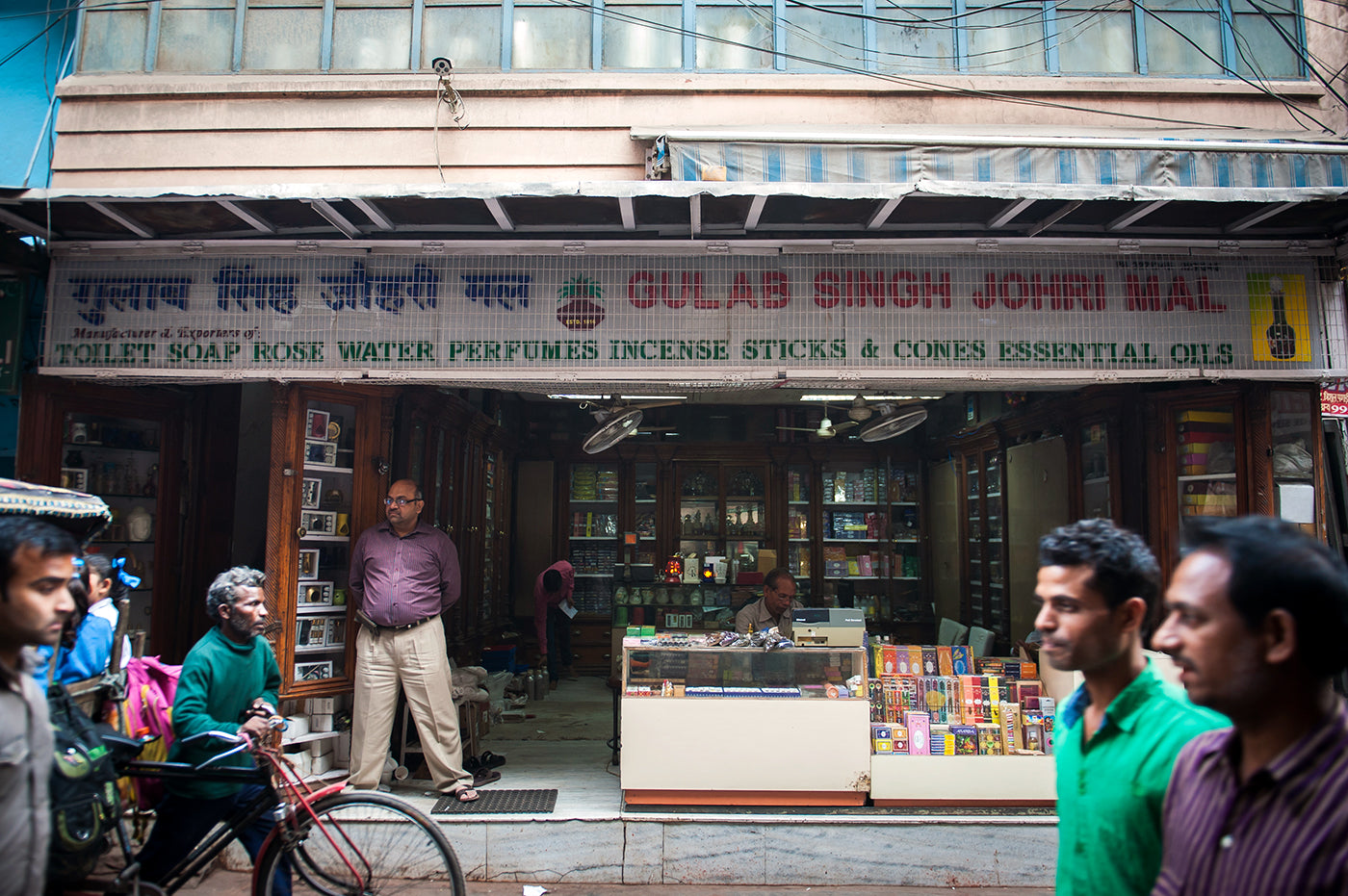
The Oldest Perfumery in Delhi
Gulab Singh Johrimal and its shadows of the past
Nestled in one of the busiest markets in old Delhi, in the Chandni Chowk area, a lively hub where bedazzled saris and elaborate lehenga cholis adorn the window displays of hundreds of boutiques, you'll find the Dariba Kalan bazaar.
In the late 17th-century, as the Mughal Emperor Shah Jahan was designing the Taj Mahal, he commissioned his daughter Jahanara to develop a marketplace where the best products and foodstuffs from their reign could be showcased. The Moonlight Square—the streets were once canals that reflected the moonlight—has been home to fresh ingredients and fine fabrics for centuries, and, since 1816, it has also been the site of Gulab Singh Johrimal, one of the oldest perfume shops in the world.

Although synthetic essences have become mainstream, the owners of Gulab Singh Johrimal prefer to work with local, organic, and handpicked ingredients. (Photo: Arkaprava Ghosh, The Essence)
What appears to be an unassuming store within the bustle that surrounds it, this perfumery is more than a specialized seller of attar essential oils and bespoke fragrances. It’s a repository for tradition, a place where ancient concoctions rest in crystal flasks, occasionally opened and swept into the streets of Delhi to be lost among the mix of deep-fried jalebis, smoking tandooris, and smog. This place is a bastion of Indian culture and natural history, carefully guarded by the seventh generation of the same family.
Usually guarding the storefront while keeping everything running smoothly is Mukul Gundhi, one of the sons of Ram Singh who inherited Gulab Singh Johrimal from his father, promising to continue running the shop just as it had been kept for over two centuries. For years, the country’s gentry and international socialites have made their way to the shop for custom-made scents based on unique combinations of rare, exotic notes.
Some of the most distinctive essential oils include extracts from the henna plant (Nardostachys jatamansi) a valerian flower that’s endemic to the Himalayas. Their formula of the rajnigandha flower—a bloom of the Polianthes tuberosa, considered to be “fit for the gods”—is regarded as a trademark of the shop. It can be found in both locations of Gulab Singh Johrimal, which are only a few doors away from each other, the second location being run by Ram’s brother, Kishan Mohan Singh, and operated by his son Naveen.

Belgian cut glass decanters store different types of perfumes. (Photo: Arkaprava Ghosh, The Essence)
The family prides itself on utilizing ancient techniques and mostly organic oils, and they seldom offer synthetic perfume, occasionally bought by customers looking for a more mainstream fragrance. Notwithstanding these rare, more commercial sales, the family encourages patrons to purchase seasonal smells, according to the Earth’s rhythm and lunar cycles. Throughout the year, the availability of the raw materials will vary, not only depending on the weather and yield but also on the delivery times of the distillers in Uttar Pradesh who supply them. Such care and attention are reflected in the price tag of the final fragrance, which can cost up to €180 ($200). Even though the bottling and handling might look rudimentary compared to the current industry standards, their processes are mostly done by hand, mixing the aromas with a dedication nurtured by heritage and developed through experience.
Throughout Gulab Singh Johrimal’s history, the company has employed approximately 50 local perfume specialists to maintain its high-quality standards as they prepare emblematic scents, most using fresh sandalwood oil as the dominant base note. All the experts that have come through the shop have left their imprint, and just like the owners, they’ve shared a vast collection of knowledge—essential information for a new cohort of aspiring perfumers who then continue their work. Despite the global competition and the drop in sandalwood oil production due to climate change, the Singhs’ legacy is set to endure for centuries to come.


Mukul Gundhi manages the store, along with his brothers Atul and Praful Gundhi (top). Praful Gundhi holds a glass decanter filled with pure perfume oil (bottom). (Photo: Arkaprava Ghosh, The Essence)
The offbeat perfume parlor has seen empires fall—at one point it was the crafter and purveyor of the fragrances used by the Mughal emperors and royal families—and has managed to navigate a fast-changing market. This is mostly thanks to the owners’ refusal to skimp on quality, even if it means selling to a smaller circle of clients. Those who have ventured into the heart of India’s capital, following their nose, can attest to the caliber and quality of the preparations. Unlike the artificial bottles found in mass markets worldwide, these meticulously extracted oils and traditionally curated smells don’t dilute and disappear after a few hours—they linger on the user’s body, clinging to their skin just as the owners have managed to hold onto the past.
This story was originally published in The Essence and written by Santiago Rodriguez Tarditi. Find out more about the book.


